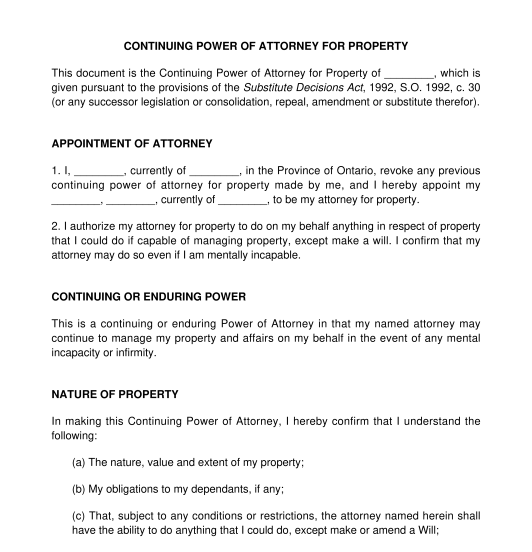 26/01/2024
26/01/2024

Answer a few questions and your document is created automatically.

Your document is ready! You will receive it in Word and PDF formats. You will be able to modify it.




Rating: 4.5 - 16 votes
Fill out the templateA Continuing Power of Attorney for Property is a legal document in which a person (the grantor) gives someone else the legal authority to make decisions about their finances. In this context, the word attorney does not mean lawyer; rather, it means agent. The power of attorney is called "continuing" because it can be used after the person who gave it is no longer mentally capable of making financial decisions themselves.
Some Provinces or Territories use the word "durable" or "enduring" which means the same as "continuing". The exact terminology depends on the Province or Territory.
Another type of power of attorney commonly used is a Power of Attorney for Personal Care. Some Provinces and Territories refer to that document as a Personal Directive, which has the same effect as the Power of Attorney for Property. However, the attorney in a Personal Directive makes decisions concerning the grantor's health, not their finances.
How to use this document?
To make a valid power of attorney, the grantor must be a specific age, which depends on the Province or Territory, but it's usually 18-19 years of age, and they must be mentally capable of giving a continuing power of attorney for property. This means that the grantor:
Specifically in this document, the grantor will:
The document must then be signed by two witnesses, in the presence of each other and the grantor. In some jurisdictions, only one witness is needed. Even if only one witness is legally required, two witnesses may still sign nevertheless.
Applicable Law
Each Province and Territory will have its own counterpart legislation dealing with powers of attorney. The law details who can make a power of attorney, who can witness a power of attorney, and how many witnesses need to sign. The definitions and the characterization of the people in a Power of Attorney differ based on the Province or Territory. Some Provinces or Territories require lawyers as witnesses to the Power of Attorney. Or it must accompany a lawyer's certificate.
How to modify the template?
You fill out a form. The document is created before your eyes as you respond to the questions.
At the end, you receive it in Word and PDF formats. You can modify it and reuse it.
Other names for the document:
Continuing POA, Continuing POA Agreement, Continuing POA Contract, Continuing POA for Property, Durable POA
Country: Canada (English)